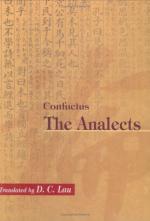|
This section contains 6,275 words (approx. 21 pages at 300 words per page) |

|
SOURCE: Wawrytko, Sandra A. “Kongzi as Feminist: Confucian Self-Cultivation in a Contemporary Context.” Journal of Chinese Philosophy 27, no. 2 (June 2000): 171-86.
In the following essay, Wawrytko contends that Confucian philosophy epitomizes the feminist agenda.
If Chinese philosophy is to be revitalized and reconstructed, it is essential that we consider the fate of a dominant force in traditional Chinese thought—Kongzi. Some scholars have argued that Confucianism constitutes “an ideological obstacle” to modernization throughout East Asia, albeit in varying degrees.1 Even those who grudgingly admit the manifest wisdom of Kongzi have charged Confucianism with obsolescence, and hence deem it unworthy of serious scholarly attention. Its “relevance” to the contemporary world thus has been seriously called into question. Tang Yijie observes: “Confucianism only tells us the reason for being a man. We should not set demands on it in other aspects, and it should come as no surprise that it suffers...
|
This section contains 6,275 words (approx. 21 pages at 300 words per page) |

|


